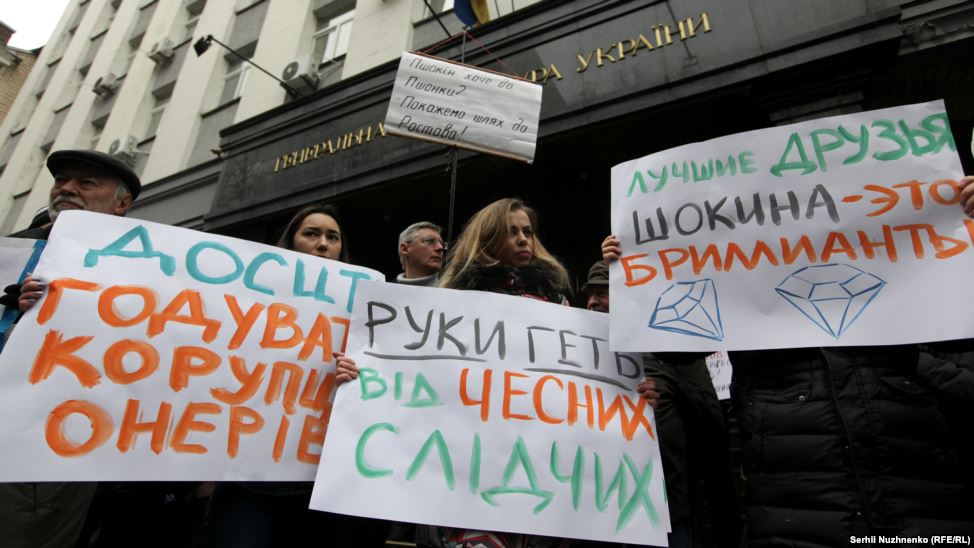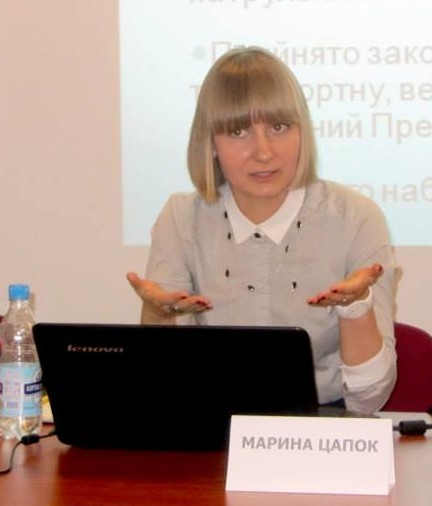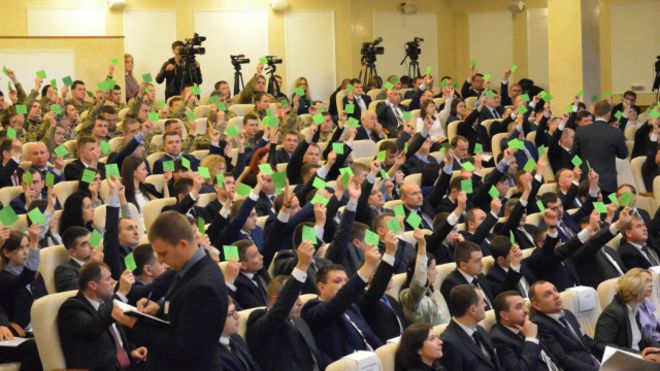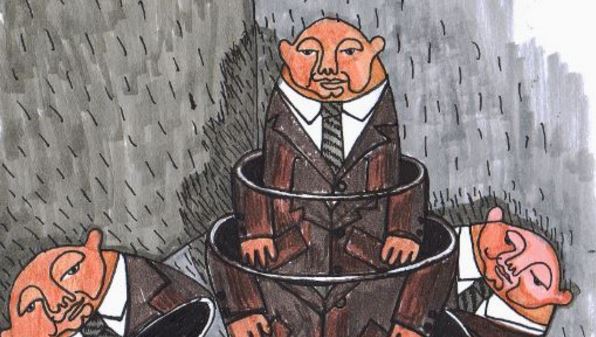On 12 May 2016, the Ukraine's presidential ally Yuriy Lutsenko was appointed to the post of the Prosecutor General. The appointment was made possible by the controversial passing of a law that abolished requirements of a law degree and work experience in the Prosecutor's office, said to be tailored specifically to appoint Lutsenko.
Read more: A new General Prosecutor for Poroshenko
This is the third in a row post-Euromaidan Prosecutor General who is faithful to the President and was vertically-appointed, which in the words of Ukrainian MP Olena Sotnyk means that "Stalin's system of manual appointment of hand-picked officials is returning." This move comes as another step toward killing hopes for a prosecution reform, without which it is unthinkable to budge Ukraine's exalted circle of cronyism and corruption. Not that there haven't been attempts. Here is an overview of how strongly the old system has resisted post-Euromaidan efforts to change it.
A cadency of failures after Euromaidan
After the Euromaidan revolution, the two new Prosecutor Generals appointed by President Poroshenko did little to fulfill the high hopes of Ukrainians for positive change in the country. Neither Vitaliy Yarema nor Viktor Shokin carried out an honest investigation of the killing of the Euromaidan protesters. Both of them featured in corruption scandals. After many months of public pressure, Shokin was finally fired on 29 March 2016. But in his reign he managed to crush the promising shoots of renewal and reform.
Open contest gets reformers into GPU
In the spring of 2015, a team of about 25 people called the "general inspection," headed by Vitaliy Kasko and Davit Sakvarelidze, passed an open contest to the General Prosecutor's office of Ukraine (GPU), and were tasked to jumpstart a reform of the system.
Vitaliy Kasko headed a working group on returning money stolen by Yanukovych's regime back to Ukraine.
Davit Sakvarelidze was a member of the team of Georgian reformers, invited by Ukraine's after-Euromaidan government to implement some of Georgia's successes in democratic transformations in Ukraine. In February 2015 he accepted the invitation of Petro Poroshenko and Ukrainian citizenship, becoming the Deputy Prosecutor General of Ukraine.
Tasked to reform the organs of the Prosecutor's Office of Ukraine, he started working on new standards of work for the central and local prosecutor's offices, developed guidelines and standards. Part of the reform was to decrease the overall number of prosecutors - ostensibly, only 10,000 of the initial 18,500 were to remain to the end of 2017.
Although he and the team encountered resistance along the way, everything was more or less bearable. Until they arrested the "Diamond prosecutors."
The "Diamond Prosecutors" and the Internal Maidan in the Prosecutor's office
On 5 July 2015, Oleksandr Korniyets, Deputy Prosecutor of the Kyiv Oblast, and Volodymyr Shapakin, Deputy Chief of the GPU's Main Investigation Department, were arrested on being suspected of a bribe. Over $500,000, unregistered firearms, and other valuables were found during searches of their premises, as well as 65 diamonds (see photos below by Ukraine's SBU). This was the beginning of the case of the "diamond prosecutors."
The incident was widely praised at the time. President Poroshenko proclaimed that "Prosecutor 'immunity' is canceled" and that he demands decisive actions to fight corruption. Mikhail Saakashvili, ex-Georgian President and now governor of Ukraine's Odesa Oblast, then commented:
"The largest anticorruption operation in the history of the GPU, conducted by young Ukrainian prosecutors... I want to congratulate the young employees, which were selected not by profitable connections, but as a result of a contest. These young girls and boys will surely build a Ukraine free from corruption."
It turned out that the diamonds were the tip of the iceberg. A month and a half after the arrest of Korniyets and Shapakin, cocaine was found in their apartments. 15 February 2016, Korniyets was accused in demanding monthly payments (up to UAH 80,000 monthly) from the Nikolsan waste utilization company, after which the company was extorted altogether. Later, Kasko informed that the costs of the London tuition of Korniyets' daughter Anastasiia ($200,000 ) were paid for by an offshore company whose director was involved in a major corruption scandal of the "Boiko derricks."
Read also: Yanukovych’s cronies still free, possessing stolen millions
According to Vitaliy Kasko, Korniyets told Sakvarelidze at the date of his detention: "I informed everybody that needs to know about my detention. If I will not be pulled out, I will give everybody away. So don't worry, you won't succeed."
"From this I conclude that the system of esprit de corps is so strong, that they know so much about each other that it's just impossible for one that starts drowning to not pull everybody else to the bottom," stated Kasko.
From the first day after the arrest of the "diamond prosecutors," the highest representatives of the GPU obstructed the work of Davit Sakvarelidze and the group of investigators and prosecutors in this case. Pressure, intimidation, and discrediting in the media was the beginning. The Prosecutor General dismissed the Korniyets and Shapakin from their posts only on 16 July; shortly after, they were freed on bail.
On 24 March 2016, Davit Sakvarelidze together with the group of prosecutors and investigators involved in the case told about about the connections between Prosecutor General Shokin and the "diamond prosecutors" and the ways in which Shokin tries to slow down and paralyze the progress of the investigation. Shokin responded by firing the investigators of this resonant case from the Prosecutor's office under the pretense of structural changes. Five days later, on 29 March 2016, Viktor Shokin fired Sakvarelidze one hour before he was dismissed by the Parliament following months of presidential stalling and public outrage.
Today, only two prosecutors from the initial team of reformers are left, and they alone continue the investigation against the "diamond prosecutors."

Persecution of Sakvarelidze and Kasko
"This attack on me and our team signals that Ukraine's rulers don't need real reforms, and this is a fact. They are purging those who are ready to fight against corruption and the old foundations every day without compromise," Sakvarelidze said when commenting his dismissal.
Today, the attack on reformers of the prosecution is ongoing. It started on 16 March 2016, when a group of MPs approached the General Prosecutor's office with requests to investigate how the "team of reformers" used money given by the USA and EU for reforming Ukraine's prosecution. The General Prosecutor's office announced that it will investigate the case and is preparing for interrogations. Sakvarelidze was also accused of violating the prosecutors ethics by organizing a rally in support of the team of reformers, which prosecutors are not allowed to do.

Sakvarelidze is convinced that the only prosecutors ethics that he violated is the ethics of crime, corruption, and esprit de corps. "Yes, this prosecutor's ethics I have violated and always will," he stated. Morever, Kasko claimed that there is nothing to investigate with regards to the money to reform the organs of the prosecution - it was never given, because one of the conditions of the grant was for Shokin to leave.

The second chief reformer, Kasko, says that the criminal proceedings against him are Shokin's personal desire for revenge and reprisal. Shokin personally made sure that the reformer's apartment in Kyiv was placed under arrest on 28 March 2016, although there are no provisions that the Prosecutor General should be the one handing out such orders. Kasko is being accused of embezzling an apartment that was given to him as a prosecutor's service housing. But according to him, he privatized and declared the flat back in 2014. A number of Ukrainian NGOs signed a collective letter in his defense, in which they demand to stop the persecutions and investigate who enabled them.
"These persecutions have no legal basis. An honest court should have closed the case right away for lack of evidence," comments on the legal side of the case Maryna Tsapok, an expert of the Reanimation Package of Reforms, a coalition of activists that set Ukraine's reform agenda after the victory of the Euromaidan revolution
President Poroshenko, who so praised the operation against the "diamond prosecutors," has not reacted to any of these events, though it is unlikely that they can take place without his knowledge.
Old system now cemented for sure
Although now President Poroshenko appointed a hand-picked General Prosecutor and passed a bill specially to get him into office, the new Prosecutor General won't actually be able to influence that much now. In October 2014, Ukraine's parliament adopted a law that was intended to make the prosecution organs more decentralized, transparent, and independent by creating two new organs - the Council of Prosecutors and Monitoring and Disciplinary commission of Prosecutors. The first will advise the Prosecutor General on appointing regional prosecutors or his own deputies. The second will select staff for working in the prosecution system and generally handle staff issues.
Though this system was envisioned to speed through Ukraine's much-needed reform, there's a problem. The employees of the prosecution from the regions who assembled at a conference in Kyiv on 27 April 2016 to elect representatives of both organs were the same people that worked under Shokin and those before him. Representatives of the old system of esprit de corps, corruption, and cronyism have elected people of their own circle to make all the decisions in the prosecution system - the reforms that had been carried out were mostly cosmetic, according to experts.

The renewal of staff in the organs of the prosecution entailed a contest to choose the local prosecutors. But if at first 60% of the candidates came from out of the system, only 22% were left after two rounds of independent testing. After the selection committees interviewed the candidates, only 3% of the successful candidates were new to the prosecution. And after Shokin's "final word," there were no external candidates left at all, according to Halya Coynash. Vitaliy Kasko estimated that 84% of the local prosecutors that Shokin appointed held those positions before, predominantly during the times of Viktor Yanukovych.
"Sakvarelidze was technically in charge of the reform. But he was denied any leverage and obstructed from the very beginning. When he announced the contest to the local prosecutor's offices, initially anybody with legal practice could participate. Shokin gave an order specifying that only acting prosecutors were eligible for ordinary posts. That was the first obstruction. Secondly, Shokin formed commissions from people under his control. No matter what Sakvarelidze did, the people who had worked in the prosecutorial organs earlier that were reelected. The third obstruction was a rule that Shokin introduced, giving him the right to choose three candidates to head the local prosecution, from which he chooses one. [...] Sakvarelidze was used as gift wrapping. Like, look, we have a wonderful reformer doing reforms. But it's like the situation when you have four blocks with the letters 'c', 'r', 'a', 'p', and you try to spell 'eternity.' It's impossible," explained Kasko.
Without honest prosecutors, there can be no justice
"In order for justice to exist, somebody has to restore it after it is violated. Three institutes in Ukraine carry this function - investigating authorities, the prosecutors, and the courts. If one of these elements does not work, there can be no justice in the country," tells Maryna Tsapok.
In Ukraine, the prosecutor's office is responsible for dealing with nearly every criminal offence. The newly-created patrol police improved the pre-criminal justice situation in cities, but anything more sever must be dealt by the prosecutors. The newly created National Anti-Corruption Bureau is responsible for investigating only a part of corruption crimes, the rest is redirected to the prosecutors; moreover, its management comes from the prosecutorial system. And it is the prosecutorial system which permits high-ranking lawbreakers to go unpunished while enriching members of their own system. For example, a recent investigation by Texty revealed 109 prosecutors driving around in a car that which costs more expensive than his/her family's income of three years. It was the inaction of the prosecutorial system that made the persecutions and killings of more than 100 Euromaidan protesters in February 2014 possible. Two years on, it is the old and unreformed prosecutor's system that is responsible for the uninvestigated deaths of Euromaidaners and unreturned funds of Yanukovych's regime which were embezzled abroad.
Is there any hope?
"In order to change the system and the rules by which it works, there has to be a political will to change the system. When the political will is present and the right rules of the game are introduced, we have to play by the rules: raise the salaries to attract professional lawyers, motivate effective people and punish the offenders. We created the general inspection to change the rules of the game, but did not find support of the management. This is why neither the new rules are implemented, nor offenders are punished."
Ms.Tsapok considers that in any large structure, there exists a significant fraction of people who are ready to adapt to the new rules of the game and a small fraction that are ready to implement these changes:
"When the pressure started, people dropped out. The majority is indifferent and follows the wind. After the Euromaidan revolution, all the employees of the law enforcing organs went quiet and waited to see where the wind would blow. The bribes stopped. But when they saw that there is still no punishment, they returned."
Ms.Tsapok tells about the special prosecutor's ethics which Sakvarelidze violated. "It exists because they live like this for years. For years they think that extorting money from business is OK. Power corrupts, and a person will get used to anything. People who deal with corruption end up living in a parallel universe. Their legal culture differs from the one society has."

The further path of Ukraine's prosecutorial reform, if it is to happen, is murky. The reformers who were ready to change it can't fight the system from inside anymore. They try to do this as members of civic society. And now their main goal is to protect the people who worked with them in the Prosecutor's Office and are now handling the case of the diamond prosecutors alone. Now they can be the next objects for persecution.
Related:
- Balancing the books: Plugging the hole in Ukraine's deficit | #UAreforms
- Banks, business and trade: chaos and opportunity in Ukraine | #UAreforms
- Revitalized and energized: Ukraine's energy reform success | #UAreforms
- Making a miracle: Ukraine's untapped economic potential | #UAreforms
- Old faces in courts endanger all Ukrainian reforms | #UAreforms
- Mixed expectations for Ukraine's new government | #UAreforms
- Ukraine's judicial reform: plus ca change | #UAreforms
- 3 reasons to be optimistic about Ukraine's battle for better bureaucracy | #UAreforms











